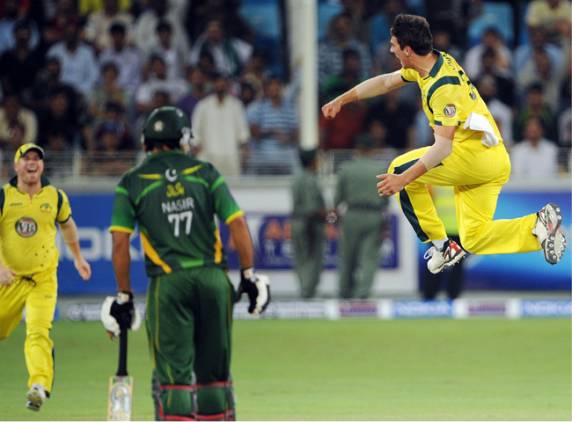
Dubai, September 11: Australia brought Pakistan down to earth with a thumping 94-run defeat in the third and final Twenty20 international at Dubai Stadium here on Monday.
Chasing a daunting 169-run target, Pakistan were all out for 74 -- the joint lowest by a Test playing country in all Twenty20s -- for their biggest defeat in the history of the shortest form of the game.
Only Nasir Jamshed (17), Yasir Arafat (15) and Abdul Razzaq (13) could reach double figures as Australian paceman Mitchell Starc (3-11) and Pat Cummins (3-15) ran through the Pakistan batting line-up.
Pakistan, who won the first match by seven wickets and the second in Super over, never looked the same side as they lost wickets at regular intervals, the first five falling by the sixth over with the score on 19.
Razzaq and Arafat shared the highest partnership of the innings with 20, taking Pakistan past the lowest total in all Twenty20 -- 67 by Kenya against Canada in Belfast in 2008.
Pakistan's previous biggest defeat in Twenty20 internationals was by 48 runs, against England at The Oval in 2009.
India were also dismissed for 74 by Australia at Melbourne in 2008.
Pakistan captain Mohammad Hafeez termed the defeat as a wake-up call.
"Unfortunately we couldn't do well in the last match," said Hafeez. "It is a wake up call ahead of the World Twenty20 and we now must realise our duties but full credit to Australia as they came back strongly."
Australian captain George Bailey praised his openers, David Warner and Shane Watson.
"The openers set the foundation for us and then the bowlers backed that with some good performances," said Bailey.
Earlier Warner made a 34-ball 59 with six sixes and a four and Watson hammered five sixes and a boundary during his 32-ball 47 to put on Australia's best opening stand of 111 in all T20s after they were put into bat.
The Australian openers went berserk from the eighth over when Watson hit Shoaib Malik for three towering sixes and from the other end Warner hit left-armer Raza Hasan for as many sixes in the ninth.
Even the successful Saeed Ajmal was hit for two sixes as Australian openers hit nine sixes in the space of 19 balls, bringing the second fifty off just 15 balls.
Paceman Arafat, who replaced Sohail Tanveer as the only change to the line-up, had both the openers in successive overs to put brakes on the Australian innings, finishing with 2-30.
Glenn Maxwell chipped in with a 20-ball 27 with three fours and six.
Ajmal finished with 2-19, taking his tally to 60 wickets -- the most by any bowler in Twenty20 cricket.
The two teams now head to Sri Lanka where the fourth edition of the World Twenty20 begins from September 18.





Comments
Add new comment